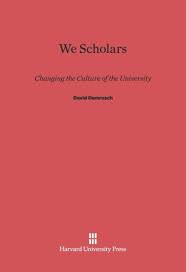We Scholars: Changing the Culture of the University (1995) by David Damrosch
GoodReads meta-data is 242 pages rated 3.83 by 6 litizens.
The central line of argument in this monograph is the long term deleterious effects of specialisation which combines with a central tendency of colleges and universities to converge on a single model, as seen in Australia where within a decade colleges of advanced education and institutes of technology assumed the name and morēs of universities, abandoning their own distinctive histories and achievements near instantly. In my small world I had an experience similar to one the author describes. Writing a letter of assessment for a candidate for promotion in one of those re-named institutions, I meant to praise and support the individual. In it I emphasised the clever means by which she had integrated current research into undergraduate courses and presented it in ways that would arrest the attention of young students, adding that I had seen her classroom interaction with students and admired it. I also said that chapters of her dissertation could be published in the fullness of time for their groundbreaking insights. Pushing back from the keyboard, I thought that this testimonial would help. Not so. In fact, quite the reverse.
I had tried to calculate the letter to match the circumstances of what was in all but name a teaching-only institution and so stressed teaching and put that comment on publication as a ‘might be.’ Both tactics were mistakes. My assessment had been sought, said an icy reply from the dean at that institution, because I was a leader in the field (no one else before or since has ever crowned me thus, so I savoured that) at the leading research University (our marketing department always said that but this was the first and only time someone outside feigned to take it seriously) in the country so that I would measure the candidate against the standard that prevailed in my milieu. Oh. By concentrating on teaching I had condemned the applicant.
While he mourns the loss of some of the fruits of a core curriculum in a common reference point, in shared experience, and in the intrinsic value of much of it (like William Shakespeare or Emily Dickinson) as compared to watching a comic book-based film, he makes a hash of the defences of the core by the likes of Allan Bloom by showing just how selective that core always was, namely that despite the loud and persistent howls of its defenders it never did include anything of the stories from the Bible, yet what could be more core to the Western tradition than that. He also shows just how narrow the focus is of one the most widely used undergraduate literary anthologies (which I had myself in those salad days), the Norton Anthology of World Literature. His aim is not to amend the core with the Bible, but to demonstrate how tenuous the justifications for the core have been.
In my years I heard the ‘curriculum’ discussed repeatedly, even annually, but in none of those discussions did I ever hear anyone talk about what a students needed to learn and how they would learn it by graduation. The discussion was always about boxes of content that might allow us to teach our research to undergraduates. In other words, the interests served were those of the teachers not the students. This order of priorities was announced early in my experience by one colleague thus: ‘It matters not what the subject is, as long as it is offered with enthusiasm.’ I put it somewhat more delicately than he did, but clearly it was all about being the centre of attention and having a captive audience to do what he liked to do. Yet these discussions of curriculum could be teleological, reasoning backward from the knowledge and experience a citizen might benefit from in later life, a civil servant, a lawyer, a social worker, a journalist, a parent, a researcher, a data analyst, a trade unionist, a community organiser, and a graduate student. Once three or four of these generic types were identified the content and the experiences were put under them, or not. By experience I mean, essay-writing, small group seminars, group work, community research by interview, statistical literacy, front of the room presentations, analysis of data, comparative assessments, revisions, seminars and other kinds of discussions, long or short essays, and so on. This approach never worked.
He also indicts the nationalism of departments to which I plead guilty, nor do I like the changes he has outlined. Dissolving departments in financial acid, which is certainly happening, will create a mass society in which individuals relate singularly and poorly to the whole. That way lies hegemony coupled with anomie and alienation, requiring a new book to address that situation with another title drawn from Nietzsche.
He is dead right about the hypocritical individualism of the humanities and social science professoriate. On the keyboard we pound out clarion calls for community engagement, civil society harmony, fraternity, and camaraderie, but themselves refuse to go to committee meetings, or worse, once there, feigning duress, fail to take the proceeding seriously during and afterwards, or concentrate on their grievances (that start with parking). Of course many committee meetings become idle talking shops but that is because of the participants, not intrinsic to such associations.
I savoured his description of academic conferences as the opportunity for delegates to patronise inferiors, pander to superiors, and sample the local cuisine. His explication of the mechanics of conferences that lead to those ends is interesting and it is juxtaposed to a residential, invited seminar of dozen specialist which was productive. Hmm, I took part in a couple of such gatherings that included Olympian professors, ambassadors, senior civil servants, and an international celebrity and found them useless. Everyone talked when it was their turn, but it was never anyone’s turn to listen, it seemed. People talked past each other in seriatim though everyone was effusive at the end about how wonderful it was. They liked the local wines, sights, and cuisines.
Though Damrosch deplores the denigration of undergraduate teaching in favour of graduate supervision, he does the same himself in that the longest chapter of the book, with one of the most developed alternatives, concerning graduate education. While its importance is undeniable, say I as one of the its products, it is not the heart of higher education for it touches so few. Of courses, there are the indirect and long term effects but they are even harder to estimate.

It is an insightful, well written, and fully researched book. Yet since its publication in 1995 the major changes in higher education have not been such as he commended, but rather, changing attitudes of students to inflate grades, and in Australia the availability of material first through the cheaper air cargo of print books and now digital technology, and ever more resources like Wikipedia or ChatGPT.

